Ellakiwale
On this page, you find all documents, package deals, and flashcards offered by seller ellakiwale.
- 121
- 0
- 0
Community
- Followers
- Following
3 Reviews received
121 items
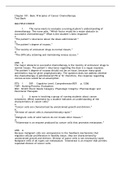
Chapter 101: Basic Principles of Cancer Chemotherapy
MULTIPLE CHOICE 1. The nurse wants to evaluate a nursing student’s understanding of chemotherapy. The nurse asks, “Which factor would be a major obstacle to successful chemotherapy?” What is the student’s best response? a. “The patient’s reluctance about the doses administered.” b. “The patient’s degree of nausea.” c. “The toxicity of anticancer drugs to normal tissues.” d. “The difficulty attaining and maintaining venous access.” ANS: C The major obstacl...
- Exam (elaborations)
- • 142 pages •
MULTIPLE CHOICE 1. The nurse wants to evaluate a nursing student’s understanding of chemotherapy. The nurse asks, “Which factor would be a major obstacle to successful chemotherapy?” What is the student’s best response? a. “The patient’s reluctance about the doses administered.” b. “The patient’s degree of nausea.” c. “The toxicity of anticancer drugs to normal tissues.” d. “The difficulty attaining and maintaining venous access.” ANS: C The major obstacl...
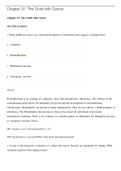
Chapter 31: The Child with Cancer
MULTIPLE CHOICE 1. What childhood cancer may demonstrate patterns of inheritance that suggest a familial basis? a. Leukemia b. Retinoblastoma c. Rhabdomyosarcoma d. Osteogenic sarcoma ANS: B Retinoblastoma is an example of a pediatric cancer that demonstrates inheritance. The absence of the retinoblastoma gene allows for abnormal cell growth and the development of retinoblastoma. Chromosome abnormalities are present in many malignancies. They do not indicate a familial pattern of inher...
- Exam (elaborations)
- • 48 pages •
MULTIPLE CHOICE 1. What childhood cancer may demonstrate patterns of inheritance that suggest a familial basis? a. Leukemia b. Retinoblastoma c. Rhabdomyosarcoma d. Osteogenic sarcoma ANS: B Retinoblastoma is an example of a pediatric cancer that demonstrates inheritance. The absence of the retinoblastoma gene allows for abnormal cell growth and the development of retinoblastoma. Chromosome abnormalities are present in many malignancies. They do not indicate a familial pattern of inher...
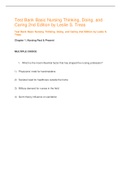
Chapter 1. Nursing Past & Present
MULTIPLE CHOICE 1. Which is the most influential factor that has shaped the nursing profession? 1) Physicians’ need for handmaidens 2) Societal need for healthcare outside the home 3) Military demand for nurses in the field 4) Germ theory influence on sanitation ANS: 3 Chapter number and title: 1, Nursing Past & Present Chapter learning objective: Define nursing in your own words. Chapter page reference: p. 7 Heading: Historical Context of Nursing Integrated Processes: Teaching and ...
- Exam (elaborations)
- • 48 pages •
MULTIPLE CHOICE 1. Which is the most influential factor that has shaped the nursing profession? 1) Physicians’ need for handmaidens 2) Societal need for healthcare outside the home 3) Military demand for nurses in the field 4) Germ theory influence on sanitation ANS: 3 Chapter number and title: 1, Nursing Past & Present Chapter learning objective: Define nursing in your own words. Chapter page reference: p. 7 Heading: Historical Context of Nursing Integrated Processes: Teaching and ...
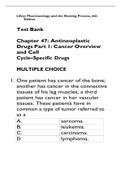
Chapter 47: Antineoplastic Drugs Part 1: Cancer Overview and Cell Cycle–Specific Drugs
MULTIPLE CHOICE 1. One patient has cancer of the bone; another has cancer in the connective tissues of his leg muscles; a third patient has cancer in her vascular tissues. These patients have in common a type of tumor referred to as a A. sarcoma. B. leukemia. C. carcinoma. D. lymphoma. ANS: A Sarcomas are malignant tumors that arise from connective tissues. These tissues can be found in bone, cartilage, muscle, blood, lymphatic, and vascular tissues. DIF: COGNITIVE LEVEL: Unde...
- Exam (elaborations)
- • 26 pages •
MULTIPLE CHOICE 1. One patient has cancer of the bone; another has cancer in the connective tissues of his leg muscles; a third patient has cancer in her vascular tissues. These patients have in common a type of tumor referred to as a A. sarcoma. B. leukemia. C. carcinoma. D. lymphoma. ANS: A Sarcomas are malignant tumors that arise from connective tissues. These tissues can be found in bone, cartilage, muscle, blood, lymphatic, and vascular tissues. DIF: COGNITIVE LEVEL: Unde...
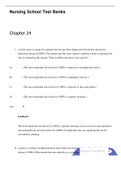
Chapter 24
1. A clinic nurse is caring for a patient who has just been diagnosed with chronic obstructive pulmonary disease (COPD). The patient asks the nurse what he could have done to minimize the risk of contracting this disease. What would be the nurse’s best answer? A) □The most important risk factor for COPD is exposure to occupational toxins.□ B) □The most important risk factor for COPD is inadequate exercise.□ C) □The most important risk factor for COPD is exposure to dust and poll...
- Exam (elaborations)
- • 28 pages •
1. A clinic nurse is caring for a patient who has just been diagnosed with chronic obstructive pulmonary disease (COPD). The patient asks the nurse what he could have done to minimize the risk of contracting this disease. What would be the nurse’s best answer? A) □The most important risk factor for COPD is exposure to occupational toxins.□ B) □The most important risk factor for COPD is inadequate exercise.□ C) □The most important risk factor for COPD is exposure to dust and poll...
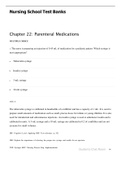
Chapter 22: Parenteral Medications
MULTIPLE CHOICE 1. The nurse is preparing an injection of 0.45 mL of medication for a pediatric patient. Which syringe is most appropriate? a. Tuberculin syringe b. Insulin syringe c. 3-mL syringe d. 10-mL syringe ANS: A The tuberculin syringe is calibrated in hundredths of a milliliter and has a capacity of 1 mL. It is used to prepare small amounts of medication such as small, precise doses for infants or young children. It is also used for intradermal and subcutaneous injections. An ...
- Exam (elaborations)
- • 29 pages •
MULTIPLE CHOICE 1. The nurse is preparing an injection of 0.45 mL of medication for a pediatric patient. Which syringe is most appropriate? a. Tuberculin syringe b. Insulin syringe c. 3-mL syringe d. 10-mL syringe ANS: A The tuberculin syringe is calibrated in hundredths of a milliliter and has a capacity of 1 mL. It is used to prepare small amounts of medication such as small, precise doses for infants or young children. It is also used for intradermal and subcutaneous injections. An ...
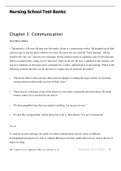
Chapter 3: Communication
MULTIPLE CHOICE 1. The patient is a 54-year-old man who has made a living as a construction worker. He dropped out of high school at age 16 and has been a laborer ever since. He never saw any need for “book learning,” and has lived his life “my way” since he was a teenager. He has smoked a pack of cigarettes a day for 40 years and follows no special diet, eating a lot of “fast food” while on the job. He now is admitted to the coronary care unit for complaints of chest pain and i...
- Exam (elaborations)
- • 22 pages •
MULTIPLE CHOICE 1. The patient is a 54-year-old man who has made a living as a construction worker. He dropped out of high school at age 16 and has been a laborer ever since. He never saw any need for “book learning,” and has lived his life “my way” since he was a teenager. He has smoked a pack of cigarettes a day for 40 years and follows no special diet, eating a lot of “fast food” while on the job. He now is admitted to the coronary care unit for complaints of chest pain and i...
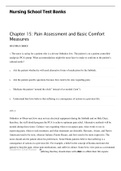
Chapter 15: Pain Assessment and Basic Comfort Measures
MULTIPLE CHOICE 1. The nurse is caring for a patient who is a devout Orthodox Jew. The patient is on a patient-controlled analgesia (PCA) pump. What accommodations might the nurse have to make to conform to the patient’s cultural needs? a. Ask the patient whether he will need alternative forms of medication for the Sabbath. b. Ask the patient specific questions because Jews tend to be stoic regarding pain. c. Medicate the patient “around the clock” instead of as needed (“prn”). ...
- Exam (elaborations)
- • 29 pages •
MULTIPLE CHOICE 1. The nurse is caring for a patient who is a devout Orthodox Jew. The patient is on a patient-controlled analgesia (PCA) pump. What accommodations might the nurse have to make to conform to the patient’s cultural needs? a. Ask the patient whether he will need alternative forms of medication for the Sabbath. b. Ask the patient specific questions because Jews tend to be stoic regarding pain. c. Medicate the patient “around the clock” instead of as needed (“prn”). ...
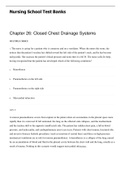
Chapter 26: Closed Chest Drainage Systems
MULTIPLE CHOICE 1. The nurse is caring for a patient who is comatose and on a ventilator. When she enters the room, she notices that the patient’s trachea has shifted toward the left side of the patient’s neck, and he has become tachycardic. She assesses the patient’s blood pressure and notes that it is 84/38. The nurse calls for help, having recognized that the patient has developed which of the following conditions? a. Hemothorax b. Pneumothorax on the left side c. Pneumothorax on...
- Exam (elaborations)
- • 24 pages •
MULTIPLE CHOICE 1. The nurse is caring for a patient who is comatose and on a ventilator. When she enters the room, she notices that the patient’s trachea has shifted toward the left side of the patient’s neck, and he has become tachycardic. She assesses the patient’s blood pressure and notes that it is 84/38. The nurse calls for help, having recognized that the patient has developed which of the following conditions? a. Hemothorax b. Pneumothorax on the left side c. Pneumothorax on...
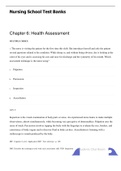
Chapter 6: Health Assessment
MULTIPLE CHOICE 1. The nurse is visiting the patient for the first time this shift. She introduces herself and asks the patient several questions related to his condition. While doing so, and without being obvious, she is looking at the color of his eyes and is assessing his ears and nose for discharge and the symmetry of his mouth. Which assessment technique is the nurse using? a. Palpation b. Percussion c. Inspection d. Auscultation ANS: C Inspection is the visual examination of body...
- Exam (elaborations)
- • 33 pages •
MULTIPLE CHOICE 1. The nurse is visiting the patient for the first time this shift. She introduces herself and asks the patient several questions related to his condition. While doing so, and without being obvious, she is looking at the color of his eyes and is assessing his ears and nose for discharge and the symmetry of his mouth. Which assessment technique is the nurse using? a. Palpation b. Percussion c. Inspection d. Auscultation ANS: C Inspection is the visual examination of body...

Chapter 06: Care of the Patient with a Gallbladder, Liver, Biliary Tract, or Exocrine Pancreatic Disorder
Chapter 46. Nursing Care of Patients With Musculoskeletal and Connective Tissue Disorders
Foundations Of Nursing 6th Edition by Barbara Lauritsen Christensen – Test Bank